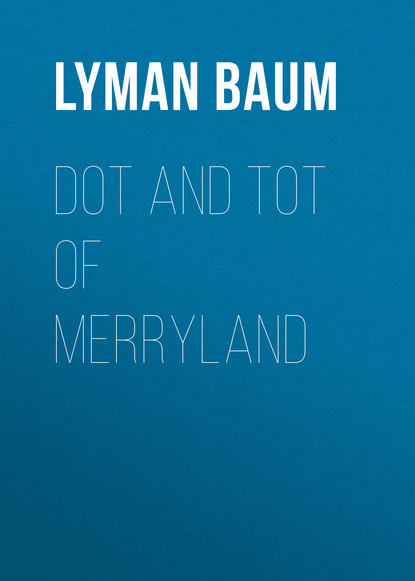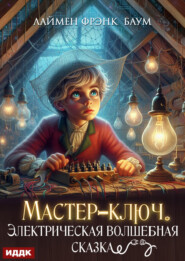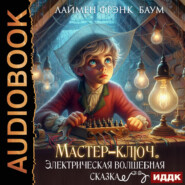По всем вопросам обращайтесь на: info@litportal.ru
(©) 2003-2025.
✖
Dot and Tot of Merryland
Настройки чтения
Размер шрифта
Высота строк
Поля
"Answer me!" said the girl. "Have you been eating our friend?"
"Well," said Tot, slowly, "he said the folks here were good to eat; an' – an' – he held his hand behind his back – right in front of my mouth; an' – so I took one of little bite off his fingers, an' – "
"Tot," said Dot, "I'm ashamed of you! The idea of eating one who has been so kind to us, and so soon after luncheon, too!"
"Pray, do not scold him," said the candy man. "He says I am good to eat, and that makes me so proud that I shall not mind the loss of my fingers. When I have time I can get some new ones patched on; so it does not matter much in the least."
Still, Dot was hurt and angry at the occurrence, and Tot walked behind them with hanging head.
Very soon they saw, sitting by the roadside, a child who was so exceedingly black in color that Dot exclaimed:
"Surely, that baby isn't made of chocolate!"
"No," said her friend, "that's a licorice child. We have a few of them in the Valley and they are much admired. But here is our stream of pink lemonade, and we will cross it by this little bridge."
The bridge was remarkably pretty, being made of pea-green and orange-colored candy, twisted together and ornamented with dainty frosted work such as bakers put upon wedding cakes.
Upon reaching the other side of the stream they found themselves near the mountains, which shut in the far side of the Valley. Dot looked up at these mountains and asked, curiously, "Who are all those people sitting on the rocks?"
At the question, Tot looked up also and saw long rows of candy men and women sitting close together at the foot of the mountains.
"Those people are the gum chewers," replied their guide.
"What are they doing there?" inquired the girl.
"They are being punished," returned the candy man, gravely. "If you look over yonder, to the left, you will see a number of low bushes. On these grow all kinds of chewing gums, and sometimes those who are naughty go out there and pick the sticks of gum."
"But I thought they had no teeth," said Dot.
"Nor have they; but their gums are hardened by long use, so they are able to chew as well as you do. This gum-chewing is a very disagreeable habit, as doubtless you know; so when anyone is discovered indulging in this habit, we make them come out here to the mountains and sit on the rocks for seven days and seven nights. It is a terrible disgrace, of course; but all naughtiness must be punished in some way."
Dot watched the gum-chewers thoughtfully for a time, being ashamed to remember that she herself had often been guilty of indulging in this condemned habit; but she said nothing about it, and soon they turned and retraced their steps past the bridge and the village and the home of their kind host, coming at last to the river's edge where they had landed.
Here Dot and Tot were surprised to find one end of their boat filled with delicious looking candies, which the colored maids had placed there during their walk, being directed in the work by the little candy woman with the Shaker bonnet.
Dot thanked the kind lady earnestly, for the food she had brought in the basket was nearly gone. Then the candy lady gave each of the children a sweet kiss, and the candy man shook hands with them, being careful not to let Tot bite off any more of his fingers.
Our little adventurers now seated themselves in the boat, and the chocolate maids pushed it off the bank for them. Soon they were drifting down the river again, and before long reached the archway that led to the Third Valley of Merryland.
CHAPTER IX. – The Third Valley
Soft strains of sweet and soothing music fell upon the ears of the children as the boat glided silently through the arch that led into the Third Valley. Then the jagged rocks surrounding them melted away in the rear, and they passed into a country that lay peaceful and smiling under the pleasant rays of the sun.
At first, Dot thought the entire Valley was carpeted with soft, white plush, but afterward she found it was a silken moss which grew thickly everywhere. There were a few trees, with wide-spreading branches, and upon these grew beautiful flowers that filled the air with delicate perfume, but in most places the Valley, which was shaped like a great cup with gently sloping sides, was open to the warm rays of summer sunshine which flooded it.
The entire scene was pretty to look upon; but what made the children's eyes open wide with wonder was the sight of hundreds of little, naked babies lying about upon the soft moss. They were waving their dimpled arms about, kicking out their chubby feet, or holding their tiny, fat thumbs in their mouths, while they cooed and crowed in a very happy and contented way. The breeze that blew gently through the trees made the music Dot and Tot heard; but the strains were soft and low, and seemed like a lullaby to hush the babies to sleep.
Some of these little ones were sleeping as the boat drew near, and they looked cozy and comfortable as they lay curled up on the moss; but others were wide awake and full of playfulness, while none of them cried or fretted or seemed a bit cross.
The babies were not the only inhabitants of this strange Valley, however. Walking among them were several long-legged, solemn-looking Storks, pure white in color, with splashes of black upon their wings. They appeared to act as nurses or guardians of the babies, and every now and then would fill a bottle with sweet milk from the fountain, and placed it beside a baby that acted as if it might be hungry. This fountain stood in about the center of the Valley and sent many sprays of new milk into the air, from whence it fell in graceful curves into a big basin of pure white marble. The nursing bottles were kept on a wide shelf at the edge of the fountain, where they were handy for the Storks to use.
While Dot and Tot were looking at the strange sights of this Valley, which was so different from the others they had seen, their boat drifted close to the shore, and one or two of the Storks came down to the river bank and looked at them curiously with their bright eyes.
Then one of the big, long-legged birds spoke to them in a voice that was soft and pleasing. "Why did you come to our Valley?" it asked. "You are too old to become babies again."
"Oh, we're not babies," said Dot, earnestly. "We're quite grown up. And we came here because we could not help it. In a few minutes we will go away again into the next Valley."
"Oh," said the Stork, "very well."
"Isn't that milk I see in the fountain?" asked the child, after a little pause.
"Certainly it is," answered the Stork; "we feed the babies with it."
"Could – could I have a drink of it?" asked Dot, who was thirsty from eating so much candy.
"Why, bless the child! Of course you can. We have plenty and to spare. Come on shore at once, but be careful not to step on the babies."
"I want a drink, too!" cried Tot, who had been so much astonished to hear a bird speak that he had remained silent until now.
"You may both drink as much as you wish," replied the Stork, in a kindly voice.
So the children stepped out upon the bank and fastened their boat, that it might not float away without them. Then, taking each other's hands, they followed the Stork over the silken moss to the fountain. There were no cups, so Dot and Tot drank from bottles; but they thought it the most delicious milk they had ever tasted.
While Dot was drinking she happened to look up into the sky, and something she saw there made her utter a cry of surprise. A fleecy, flower-like bud was floating, lightly as thistle-down, high in the air, and seemed to be slowly dropping into the Valley.
"What is that?" asked the girl, wonderingly.
"That?" answered the Stork, turning its head sideways so that its round, black eye could look at the sky; "why, that's a baby-blossom to be sure."
"And what is a baby-blossom?" inquired Dot.
"Wait a moment and you will see," replied the Stork.
Slowly and gently the white object floated downward, and even as Dot and Tot watched it, the fleecy blossom sank upon the moss a few feet from where they stood. Then one white leaf unfolded, and another, and still another, until they saw lying in the center of the flower a beautiful baby, fast asleep. While the children looked upon this sight, hushed and silent at the wonder of it, the leaves of the blossom faded away and disappeared, while the new baby rolled over and opened wide its big, blue eyes.
"It will be hungry after the long journey," said the old Stork, and, filling a bottle at the fountain, the bird carried it in its long bill to the baby and began to feed it, crooning at the same time the following verse:
Hushaby, lullaby,
Sweet flower from the sky;
Glad be thy dreams, for thy
Life lies before thee.
Soon shalt thou be at rest,
Soon fondled and caressed,
Pressed to the mother's breast
Who will adore thee.
The baby looked up at the Stork, smiled sweetly and then closed its eyes in sleep; while Tot, who had watched this scene with much interest, asked in a low voice, "Do all the babies come from the sky?"

















